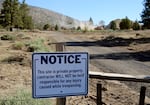
Public land surrounds the Thornburgh destination resort site in Central Oregon's Deschutes County. File photo taken June 22, 2022.
Emily Cureton Cook / OPB
One of the largest groups of Indigenous tribes in Oregon has asked for a seat at the table in discussing the controversial Thornburgh Resort planned in Central Oregon.
The request came as the Deschutes County Commission on Wednesday mulled an appeal from Thornburgh’s developers, after a county hearings officer rejected the resort’s new Fish and Wildlife Management Plan in December, saying the developers had shown little evidence they could mitigate the loss of wildlife and water.
Deschutes County code requires that destination resorts result in “no net loss” of fish and wildlife habitat in order to be approved.
The proposed resort, located just southwest of Redmond, has been tied up in litigation for nearly two decades, with opponents arguing it could negatively affect water supplies and wildlife in the surrounding area. Thornburgh has also faced increased scrutiny as Oregon leaders have started to more closely examine declining groundwater levels in the state.
Despite the attention and legal hang-ups, construction on the resort is already underway and water rights surrounding the proposal are making their way through the courts.
In the new management plan, Thornburgh developers said they would reduce the annual number of gallons consumed annually by 35% compared to a previously approved 2008 plan.
Since 2008, the state has taken a stricter approach to managing water supplies in Central Oregon, as groundwater levels have decreased and wells have begun to run dry.

A map shows the footprint of the nearly 2,000-acre Thornburgh resort site in relation to Redmond, Ore.
MacGregor Campbell / OPB
Representatives from the Confederated Tribes of Warm Springs appeared before the county commission and asked that they receive time to review the potential impacts on wildlife, since the tribe co-manages fisheries and other wildlife in the region.
Warm Springs Natural Resources General Manager Austin Smith Jr. said in a statement to the county that tribal officials had not been consulted on this new plan.
“Despite this oversight, the Tribe nevertheless felt it was necessary now to participate to ensure that the County had relevant information pertaining to the Tribe’s co-management role,” Smith wrote in prepared remarks.
Smith asked for 30-60 days to review Thornburgh’s mitigation plan; the commission decided to give them 14 days to review, given the statutory March 12 deadline for a decision.
A recent audit by the secretary of state’s office said government officials should make more of an effort to include tribes when it comes to land use because “Tribes have historically been left out of water planning and water rights decisions in Oregon.”
Oregon’s tribes are sovereign nations and are supposed to have legal standing similar to a state or federal agency. Warm Springs is expected to provide written comments about the Thornburgh water use plan at a later date.
The Oregon Department of Fish and Wildlife had two representatives at Wednesday’s meeting as well, both of whom said the resort hasn’t clearly shown how it would mitigate losses to wildlife and stream flow.
In particular, ODFW Water Policy Coordinator Danette Faucera said Thornburgh’s self-produced analysis lacked enough detail to be independently confirmed.
“ODFW has not yet received information sufficient to allow it to conclude that the assumptions placed on the modeling efforts are valid,” Faucera said.
The three-member County Commission gave little indication which way they would vote ahead of their deadline, but Phil Chang, the commission’s lone Democrat, said he also wanted a third-party review of Thornburgh’s models.
“I need some kind of external, objective validation, so that I know that I’m not just looking at a black box,” Chang said.
Thornburgh ’s attorneys argued that their resort is being singled out and that the region’s four other destination resorts did not include fish in their mitigation plans.
Nearly 200 written comments were submitted to the county regarding the appeal and Wednesday saw more than three hours of public testimony. The vast majority asked the commission to reject the appeal.
